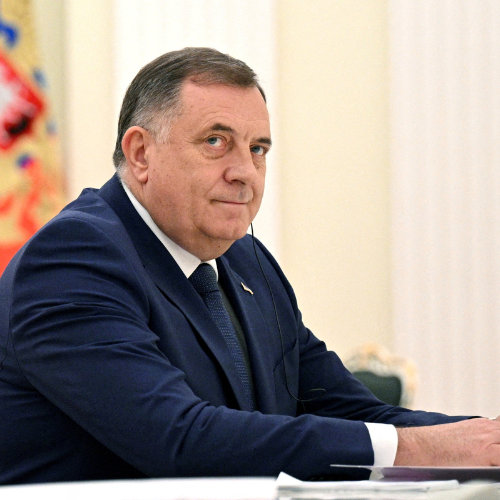The United States recently took strong action against a hidden network of companies it says were created to avoid sanctions imposed on Milorad Dodik, the president of Republika Srpska. Republika Srpska is an autonomous region within Bosnia and Herzegovina, a country in the Balkans. The U.S. Treasury Department blacklisted a company called Elpring d.o.o., along with its director, Vladimir Perisic, alleging that they are part of a scheme to bypass U.S. sanctions.
Dodik, who has been on the U.S. sanctions list since 2022, is accused of using his government position to enrich himself, his family, and close associates. The U.S. claims he directs government contracts and resources to companies he controls, benefiting himself and his son, Igor Dodik. Officials argue that these actions hurt the people of Bosnia and Herzegovina and threaten the peace and stability of the region. This recent sanction is part of a broader effort by the Biden administration to address corruption in the Balkans and uphold peace agreements established after the Bosnian War in the 1990s.
A New Company to Avoid Old Sanctions
The U.S. sanctions against Elpring d.o.o. and its director, Vladimir Perisic, are based on claims that Milorad Dodik’s network has been trying to get around previous sanctions. According to the U.S. Treasury Department, Elpring was created specifically to continue the operations of Kaldera Company El PGP d.o.o., a company sanctioned in June of this year. The U.S. claims that Igor Dodik, Milorad’s son, directed Milenko Cicic, an associate who was also sanctioned in June, to set up Elpring as a replacement for Kaldera.
This setup allegedly allowed Kaldera’s assets, contracts, and operations to move under Elpring so the Dodik family could keep business running as usual without interference from the original sanctions. By creating new companies, moving assets, and appointing new directors, Dodik’s network is said to hide their activities, making it harder for the U.S. to monitor them and enforce sanctions. According to U.S. officials, these actions allow the network to control millions of dollars in resources and assets, free from restrictions.
These latest sanctions freeze all U.S.-based assets belonging to Perisic and Elpring and prohibit U.S. individuals or companies from doing business with them. U.S. officials say these sanctions are necessary to prevent corrupt networks linked to Milorad Dodik from continuing to benefit financially from their positions of power.
U.S. Sanctions Russian Hackers for Dangerous Water System Attacks in Texas
Milorad Dodik: A Threat to Regional Peace and Stability
Milorad Dodik has been under U.S. sanctions since 2022, accused of corruptly using his position to benefit himself while destabilizing Bosnia and Herzegovina. U.S. officials argue that Dodik’s actions not only serve his interests but also threaten the Dayton Peace Agreement. This agreement ended the Bosnian War in 1995 and established Bosnia and Herzegovina’s current structure, including Republika Srpska. His continued support for Republika Srpska’s independence and his alleged use of government resources to serve his inner circle are seen as direct challenges to this peace framework.
According to the U.S., Dodik leverages his position as Republika Srpska’s president to direct government contracts to family members and trusted allies, securing wealth and power. His son, Igor, also under U.S. sanctions, plays a significant role in this alleged network. This close circle allows Dodik to pursue his political goals and hold onto his influence, U.S. officials say.
These sanctions were imposed by the Biden administration under a 2021 executive order signed by President Joe Biden, which grants the U.S. authority to target individuals and entities that threaten peace and stability in the Western Balkans. The State Department echoed these points, with press secretary Matthew Miller stating that large-scale corruption erodes trust in Bosnia’s institutions and the rule of law. “The U.S. sanctions have been aggressively circumvented by the Dodik network through strategies of restructuring and reestablishing corporate entities, allowing control to be obscured and assets to be transferred from designated entities,” he said.
U.S. Commitment to Exposing Corruption
The announcement from the U.S. Treasury also featured a statement by Bradley Smith, the Acting Under Secretary for Terrorism and Financial Intelligence. Smith highlighted the U.S. commitment to holding Dodik and his network accountable. “The privileged positions of RS President Milorad Dodik, his associates, and his enablers continue to be used to erode public confidence in the regional peace frameworks and institutions that have brought stability and security to Bosnia and Herzegovina,” he said. Smith added that the United States will keep working to expose attempts by Milorad Dodik and his family to maintain what he described as “corrupt patronage networks.”
While Dodik’s supporters recently celebrated political events, including the election of Donald Trump as the 47th U.S. president, the Biden administration remains focused on enforcing sanctions and preventing any evasion efforts.


